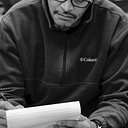The Power of Thinking in a Rhythm
This is my third letter since the onset of the COVID-19 epidemic. I anticipated life would somehow return to something more consistent in three, maybe four, months. Life would be different, but we could start doing again.
In June, concerts were still advertising events and galas were still being planned. I was thinking, of course, experts could foretell the end of this pandemic inconvenience. And now, seven months later, we still don’t have a guesstimate of when this will end. All the while we’re still doing — going forward and backward, to the left and then a pivot to the right. I hear unfamiliar music playing in my head, it feels like a new line dance.
Adding to the confusion of COVID-19, we are knee deep in the final stages of our national elections. As great as our nation is, this is our way of vomiting up our elected leaders. More planning, more doing.
The new complexities within our world have now collided with the typical heightened sensitivity we see every four years. People are more aware of individual rights. Everyone’s issue is the most important issue, and their issue should be the most important issue to you as well. This election process reflects the best and worst of us. A cesspool of hatred, aspiration, those having too much and those not having enough, those that are informed and those that are uninformed. With all the life and world elements to consider, our only course of action is to react. More doing.
To date, COVID-19, and by extension any world event happening during the pandemic, has been closely tied to doing. With every new statistic, with every update from the Governor, with every news report, with every CDC update, with every contradiction from the President, it’s doing.
It’s like playing on a spinning wheel and then rushed to walk a straight line. With every pronouncement and every national event, the spinning wheel gets faster. Maybe we believe that doing is value. Thinking seems too wasteful, a luxury that could not help solve any problem. Well maybe. What if we pull back for a second and ask the question, what actually is the problem or what are we trying to solve?
In all the doing, maybe thinking is the better option. Even with all the speed of the spinning wheel there is a solution to the dizziness, and it’s finding a spotting point. Finding a spotting point reduces anxiety because there’s an element of predictability. The spotting point helps put the spinning in a context. Maintaining the spotting point requires focus and intentionality, two of the main qualities needed as a leader and the activity of thinking.
I would not wish this pandemic on anybody; however, I’ve valued the time to think. Personally, my thinking is not a type of meditation (highly recommend) or daydreaming. I’m also intentional about not allowing my mind to become highjacked by social media, friends or family, or any outside influence. Thinking is ME directed. It is the most selfish, and important, of activities.
Ultimately, the idea is to be intentional about thinking and create habits related to your core values and beliefs. Thinking colors the world and becomes the basis of plans, manifesting itself into physical action (e.g. hiring, policies, coaching, and even friendships).
Intentional thoughts focus on the things that matter — your “why.” Consider the people you are responsible for, what your organization should stand for, how to show-up better at home. Does humanity really matter or is it just business? Do ideas that stem from individuals with unique experiences matter? Does treating people equally matter? How does that even look? Am I treating people as unique opportunities to learn or tools for my objective?
Thinking allows us to reframe and challenge our assumptions. Thinking allows us to realize the mind-shift resulting from the influences floating around. Thinking allows us to reassess the mindlessness of doing. Thinking promotes organizational clarity, which helps in the organization decision making process. And above all, there is an intentionality to what you and your organization want to become.
My point is that thinking has tremendous value in creating the spotting points that contextualize all the stuff we do. Maybe I’ll never master the line dance, but I do know that I hear the music more clearly, and understand the rhythm a little better when I think before my next step.
